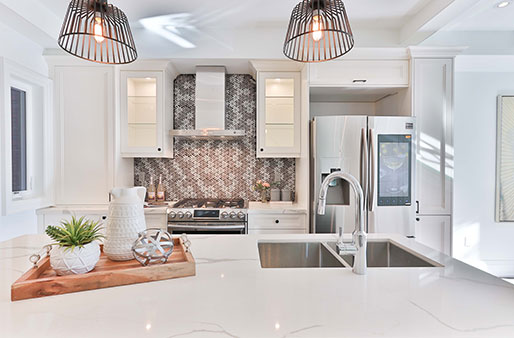Are you building a brand new kitchen or remodeling an existing kitchen? There’s a lot to consider if you want to have a beautiful kitchen that impresses you and your guests over the years. Of all the details, cabinets and cupboards, appliances, and so on, perhaps few details can make such a big impact as the benchtop.
What’s the best type of material for your kitchen benchtop? Below are a few of the best:
Engineered Stone & Quartz
Few would argue that the cream of the crop in stone benchtops are the all-around superior engineered stone and quartz benchtops. These materials are extremely durable, easy to clean and maintain and look fantastic.
Engineered stone is a favorite of many homeowners because it is a clever blend of natural stone and synthetic materials (resin). This gives the benchtop top-notch structural strength and an impermeable barrier that resists water and spills. Still, it allows designers to color and texturize the countertop in a wide array of aesthetic styles.
The only downside to engineered stone and quartz is that the corners of the benchtop can be somewhat weak to heavy impact. A dropped bottle or toaster could chip off a piece from the corner, so ensure that your benchtop is professionally installed and that you exercise caution when near it.
Sealed Marble or Granite
Sealed natural stone materials like marble and granite are superb in terms of quality, durability, and for their appearance. Marble of course, evokes Italian charm and appears more upscale. At the same time, granite is more pared back yet fits into just about any kitchen aesthetic, including traditional shakers and contemporary kitchens.
There are so many positives to marble and granite stone benchtops, but a few noteworthy disadvantages put them in solid second place. For starters, these materials are susceptible to abrasion so excessive scrubbing can lead to scuffs and scratches. Moreover, excessive exposure to acids (including citrus and cleaning products) can eat away at the sealant. Be sure to reseal a natural marble/granite countertop as needed, such as once per year or so.
Laminate
It should first be mentioned that laminate is not technically a stone material, even if high-quality laminate has the appearance of natural stone. Nevertheless, we’re placing laminate on this list because it is a superbly affordable alternative to engineered stone, quartz, and granite.
Laminate is a synthetic material that is naturally repellent to stains and spills, making it quick and easy to tidy up and to restore the clean sheen of its surface. They’re also waterproof, which helps to protect the material underneath from rotting or mildew.
Concrete
Concrete is normally used in structural applications and much less often in decorative applications such as for a kitchen countertop or a bathroom vanity. Nevertheless, it is attractive for some interior design styles and is also quite cheap compared to engineered stone, for example.
The problem with concrete is that it’s not very versatile aesthetically and that it’s also quite brittle. Many people may or may not know that concrete is “strong in compression, weak in tension.” Used as a structural support column for a massive sporting arena? No problem. Concrete can be brittle and weak in many other applications, such as when used as a countertop.
What’s the Best Benchtop Material for Your Kitchen?
The best benchtop material for your kitchen is one that meets your budget aesthetic preference and is built to your preferred specifications, and that will stand the test of time. Don’t settle on the first style you see online. Instead, consult with a reputable fitter of quality stone countertops such as Stone Benchtop Connection.
Stone Benchtop Connection
Consult with us at Stone Benchtop Connection and bring your kitchen to life with a beautiful countertop.




